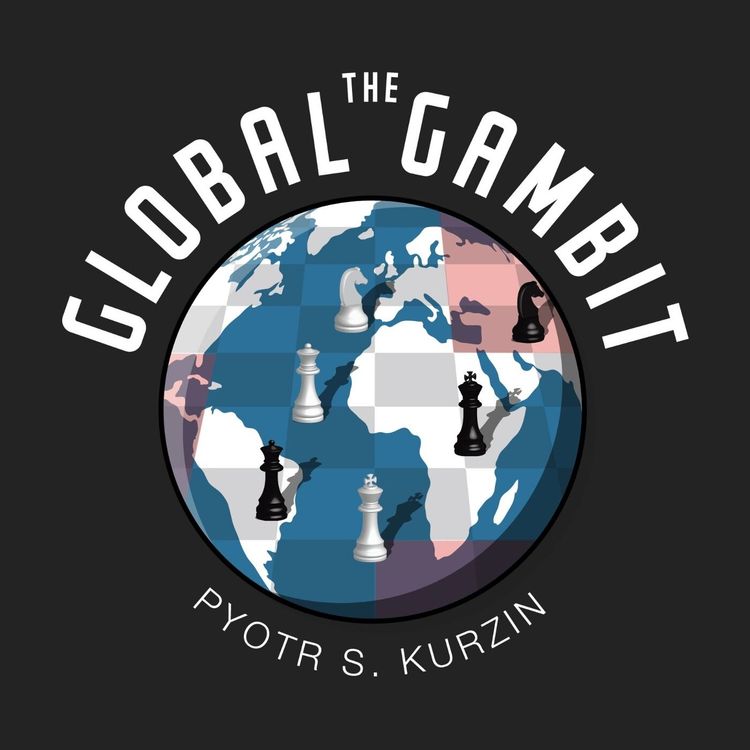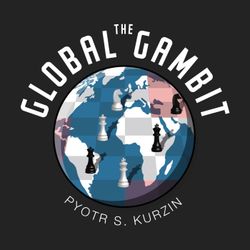Share

The Global Gambit
My Biggest Geopolitical Risks In 2025
Welcome to the Global Gambit 2025 - after some minor time off, we're back with more conversations and content, including more from me. This time starting with the 5 biggest geopolitical risks and themes in 2025!
This time Pyotr discusses the major geopolitical risks and themes that could shape 2025, including the implications of Donald Trump's return to power, the ongoing US-China strategic competition, the autocratic relations involving Russia and Iran, the rise of political violence and extremism, and the increasing risks associated with technology and AI. Each of these themes is explored in depth, highlighting the interconnectedness of global events and the potential consequences for international stability.
Read as well as listen as l overthink for you: https://substack.com/@pyotrskurzin
- X/Twitter: https://twitter.com/PKurzin
- YouTube: https://www.youtube.com/channel/UC7-TPqKMViddKZeo4K2P2jg/
- Patreon: https://www.patreon.com/theglobalgambit
- Buy Me a Coffee: https://www.buymeacoffee.com/theglobalgambit
Leave a quick rating—it's free, easy, and honestly, the least you can do after I've blessed your ears with such wisdom. Where would you be without me?
More episodes
View all episodes

Will Emerging Markets Lead the Next Financial Revolution?
34:19||Season 2SummaryIn this conversation, Pyotr Kurzin and Mitch Mechigian discuss the evolving landscape of geopolitics and finance, particularly focusing on the role of cryptocurrencies and stablecoins. They explore Trump's shift from skepticism to support for crypto, the normalization of digital currencies among nation-states, and the implications of geopolitical events on the crypto market. The discussion also highlights the rise of stablecoins as a significant player in the financial system and the potential for emerging markets to lead the next wave of crypto adoption.
What Happens to the Global Economy After US Hegemony?
44:10|SummaryIn this conversation, Pyotr Kurzin and Martin Wolfe discuss the evolving landscape of global economics, focusing on the return to regionalism, the implications of geopolitical uncertainties, and the role of currencies in the modern economy. They explore the impact of Trump's trade policies, the rejection of globalization, and the future of the US dollar amidst rising nationalism and protectionism.Martin Wolf is chief economics commentator at the Financial Times, London. He was awarded the CBE (Commander of the British Empire) in 2000 “for services to financial journalism”.
Is a Nuclear Iran Inevitable Now?
27:12|SummaryIn this conversation, Dmitri Alperovitch discusses the intricate geopolitical dynamics involving Russia, Iran, and China, focusing on Iran's nuclear ambitions and the implications of recent Israeli military actions. The dialogue explores the vulnerabilities of Iran's leadership, the reactions of global powers, and the potential future of negotiations surrounding Iran's nuclear program. The conversation emphasizes the delicate balance of power in the region and the strategic decisions that Iran must navigate in light of its recent setbacks.Dmitri Alperovitch is a geopolitical strategist and co-founder of the Silverado Policy Accelerator.
Is Trump Triggering Gold to Replace the Dollar?
32:12|Summary In this episode, Pyotr Kurzin speaks with Frank Giustra about the spiralling U.S. debt crisis, the fragility of dollar dominance, and how rivals like China and the BRICS bloc are accelerating moves away from the post-war financial order. From unfunded liabilities to currency alternatives, we unpack whether the U.S. is facing a market correction — or the beginning of the end of its global economic power.Frank Giustra is a Canadian entrepreneur, philanthropist, and geopolitical thinker. He is co-chair of the International Crisis Group, founder of Lionsgate, and former CEO of Goldcorp.
Why Didn't Oil Prices React to the Middle East Crisis?
32:19|Summary This conversation delves into the intricate relationship between energy geopolitics and conflict, particularly focusing on the Iran-Israel tensions and the implications for global oil markets. Anas Al-Hajji provides insights into the strategic importance of the Hormuz Strait, the dynamics of oil pricing, and the roles of major players like the US and Russia in shaping energy policies. The discussion also highlights the future of energy demand in light of climate change and technological advancements, emphasizing that the world cannot overlook Iran's potential in the energy sector. Dr. Anas F. Alhajji is a leading energy economist and former chief economist at NGP Energy Capital, known for his global expertise in oil markets, energy policy, and macroeconomic strategy.
7. Are Russia's Tactical Gains Offsetting Its Strategic Setbacks?
31:22||Season 2, Ep. 7Ukraine’s frontline is holding, but the real battle may be behind closed doors. As peace talks falter, Russian forces regroup, and Western support for Kyiv begins to fray. In this episode, former UK Defence Attaché John Foreman joins me to unpack the fragile diplomacy, shifting battlefield tactics, and the deeper power struggles shaping the war’s next phase. We explore how Russia’s economy is adapting under sanctions pressure - barely, and why internal shakeups in the Kremlin could point to a regime preparing for escalation, not peace.
6. How Close Were India & Pakistan to Nuclear War Really?
33:38||Season 2, Ep. 6In this episode l am rejoined by Ankit Panda as we delve into the escalating tensions between India and Pakistan, particularly focusing on the recent military clashes and the implications of their nuclear doctrines. Ankit provides insights into the current crisis, comparing it to past conflicts and discussing the role of the United States in de-escalation efforts. The conversation also touches on the influence of domestic politics, the evolving military capabilities of both nations, and the potential impact of China's military developments on the region.Ankit Panda is Stanton Senior Fellow in the Nuclear Policy Program at the Carnegie Endowment for International Peace. Watch our talk on YouTube: https://youtu.be/P3xwmHg9g7I. Support the show on Patreon: https://www.patreon.com/theglobalgambit
5. How Close Was Wagner Group To Actually Toppling Putin?
36:14||Season 2, Ep. 5In this podcast, I was joined by Candace Rondeaux to discuss her new book, Putin's Sledgehammer, on the rise and fall of Russia’s Wagner Group, particularly the aftermath of its 2023 mutiny. Candace explores the historical origins of the Wagner Group, its ties to Russia's mafia, and its key role in Russia's global operations.She delves into the evolution of the group under Prigozhin, highlighting its use in proxy wars and mercenary operations in Africa, Ukraine, and Syria. We also cover the power struggles between Putin and Prigozhin leading to the group's collapse and an examination of Wagner’s lingering influence on global security.Candace Rondeaux is the Senior Director of Future Frontiers at New America. Check out her book, Putin's Sledgehammer here: https://amzn.to/4me0FMB
Will Trump Actually Try to Retake Panama?
27:52|SummaryThe conversation delves into the strategic significance of the Panama Canal amidst rising US-China tensions, exploring the implications of recent US military agreements and the Panamanian government's response to pressure from the Trump administration. Experts discuss the historical context of US-Panama relations, public sentiment in Panama, and the potential economic consequences of climate change on the canal's operations. The dialogue emphasizes the delicate balance Panama must maintain between its relationships with the US and China, as well as the internal political challenges it faces.Will Freeman is a Fellow for Latin America Studies at the Council on Foreign Relations, where he focuses on regional politics, corruption, organized crime, and U.S.–Latin America relations.